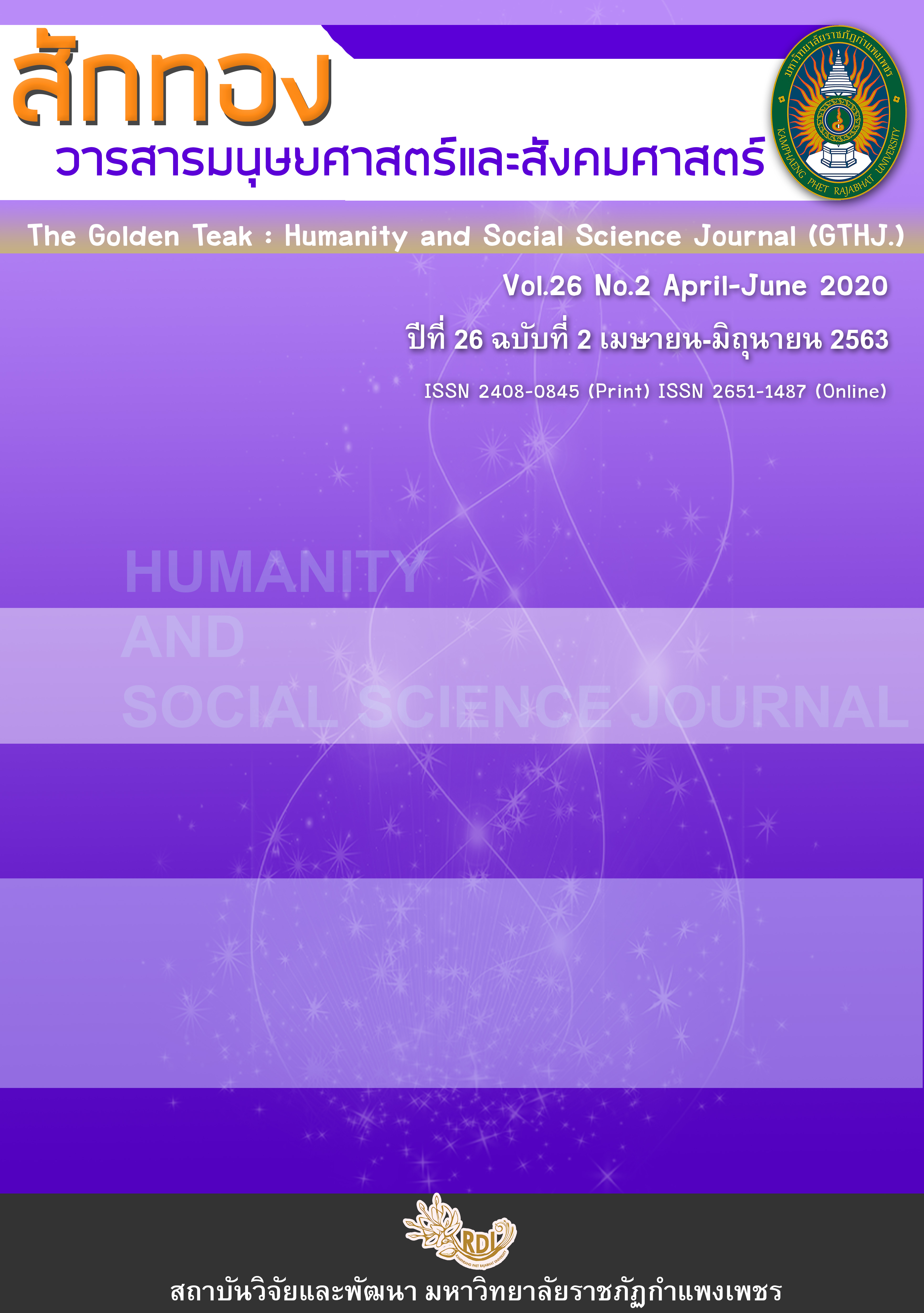A Development of Training Curriculum for Enhancing Competencies of Academic Program Chiefs in Rajabhat Mahasarakham University
Main Article Content
Abstract
The purposes of this research were to study levels of competencies and needs assessment to develop of RMU academic program chiefs, to develop a training curriculum, and to study the results of using the training curriculum. This research and development was organized into 3 phases. Phase 1 was studying competency levels and needs assessment to develop of RMU academic chiefs. Competencies and needs assessment questionnaires were used with 75 academic chiefs, and 20 administrators and related personnel were interviewed. Phase 2 dealt with the developing of training curriculum for enhancing competencies, a draft of curriculum was criticized and appropriateness evaluated by 15 experts. On phase 3 the developed curriculum was tried out through 30 RMU academic chiefs, using rubrics scoring technique evaluated the competencies of trainees through workings and learning logs. The research statistics were basic statistics and content analysis. Results of the research were as follows:
1) competencies of RMU academic program chiefs as overall at a high level. When each competency was considered, it found that the 3 competencies at the highest level were commitment in working, have vision in management, and have service mind, where as the 3 lowest level were knowledge and understanding in budget management, ability to meeting operation, ability to empower others, and knowledge and understanding in academic legal. The needs assessment to develop were found that: the academic program chiefs wanted to develop themselves in 15 titles, the 3 rd significance titles were direction of Thai higher education, knowledge of teaching in 21st century, and knowledge of curriculum and learning. 2) The results of curriculum developing were found that: curriculum structure consisted of 6 factors and contents were divided into 7 learning units. The evaluated appropriate were at a high level. 3) The results of curriculum testing were found that: the trainees had competencies in a very good level (the pass criteria was good or higher level). Recommendations concerning policy of the RMU were using this curriculum as a standard curriculum for enhancing competencies of the academic program chiefs.
Article Details
บทความที่ได้รับการตีพิมพ์เป็นลิขสิทธิ์ของวารสาร สักทอง : วารสารมนุษยศาสตร์และสังคมศาสตร์ สถาบันวิจัยและพัฒนา มหาวิทยาลับราชภัฏกำแพงเพชร
ข้อคิดเห็นใดๆ ที่ปรากฎในวารสารเป็นวรรณกรรมของผู้เขียนโดยเฉพาะ ซึ่งมหาวิทยาลัยราชภัฏกำแพงเพชรและบรรณาธิการไม่จำเป็นต้องเห็นด้วย
References
Chongrutham, P. (2016). The Development of Training Course on the Enhancement of Academic Staff’s Instructional Management Competencies in E-Sarn Rajamangkala University of Technology. Sakthong Journal of Humanities and Social Sciences, 22(2).
Mahasarakham Rajabhat University. (2016). Report on Internal Educational Quality Assessment in 2015. Mahasarakham : Mahasarakham Rajabhat University.
McClelland, David C. (1973) . Testing for Competence rather than Intelligence. [Online]. Available : www.ei.Haygroup.com. [2005, December 11].
Mintzberg, H. (1973). Structure In Fives : Designing Effective Organizations. Englewood Cliffs, NJ : Prentice-Hall.
Namwat, P., et al. (2002). Concept on Organizational Management Designed for Assembled Material for Organization and Management. Nonthaburi : Sukhuthaithammathirat Open University.
Office for Educational Reform. (2002). The Development of Indicators Used for Assessing Regional Educational Administration Quality. Bangkok : Tharn Arksorn.
Office of the Basic Education Commission. (2011). Guidelines for Learning Management to the ASEAN Community. Bangkok : The Agricultural Cooperative Assembly of Thailand Limited.
Office of the Civil Service Commission (OCSC), (2005). Deployment of Human Resource Management Competencies : Document for Seminars on the Performance of Civil Servants. [Online]. Available : http://www.competency.mju.ac.th/doc/11562.pdf. [2017, December 11].
Office of the National Economics and Social Development Board. (2018). Summary of the National Economic and Social Development Plan Twelfth Edition, 2018-2022. Bangkok : Office of the National Economics and Social Development Board, The Prime Minister.
Ozcelik, G. & Ferman, M. (2005). Competency approach to human resources Management : Outcome and contribution in a Turkish cultural context. Human resources Development Review, 5(1), 72-91.
Panyarot, S. (2012). How to Be an Effective Administrator. Bangkok : S.Asia Press (1989).
Rakpapong, W. (2012). Career Development & Succession Planning. Organized by Omega World Class Research Institute Held on March 2012, at The Sense Regis Hotel. Bangkok : Omega World Class Research Institute.
Razik, et al. (2001). Fundamental concepts educational Leadership. (2 nd ed.). New Jersey : Mernill Prentice Hall international.
Rosenetal, B., Furst, S.A. & Blackburn, R.S. (2006). Training for virtual teams : An investigation of current practices and future need. Human resources Management, 45, 229-247.
Srisa-ard, B. (2002). Introduction to Research. Bangkok : Sureeriyasarn.
Taba, H. (1962). Curriculum Development : Theory and Practice. New York : Harcourt, Brace & World.
Tiyao, S. (2001). The Principles of Administration. (2 nd ed.). Bangkok : Thammasart University Press.
Wongwanich, S. & Wiratchai, N. (2005). The Follow-up and Assessment of National Essential Welfares Based on the Government’s Policies and National Educational Act. Bangkok : Chulalongkorn University.

